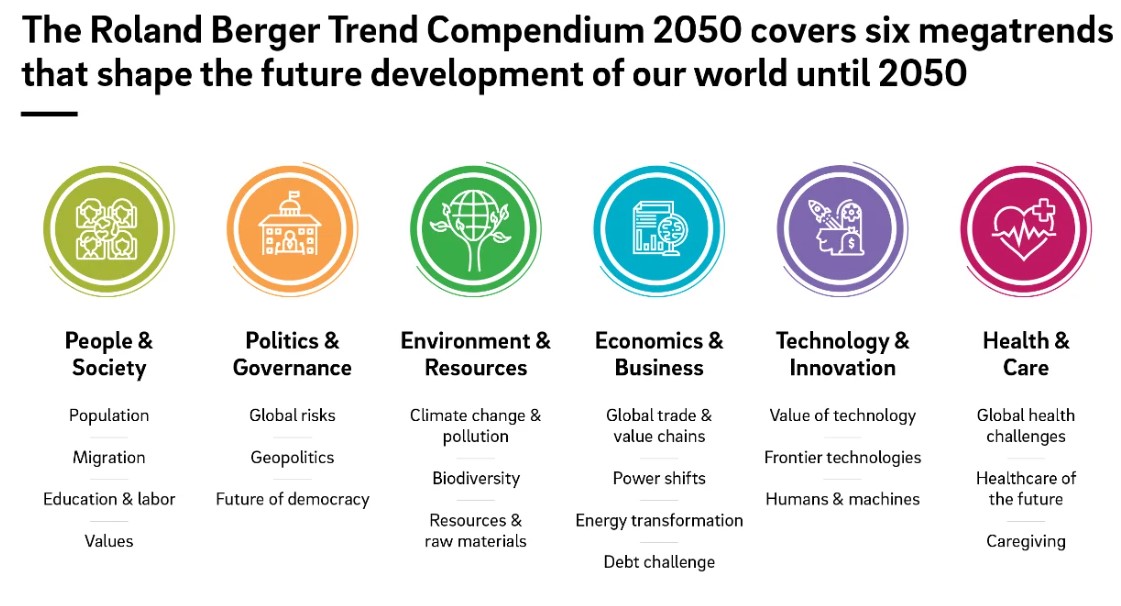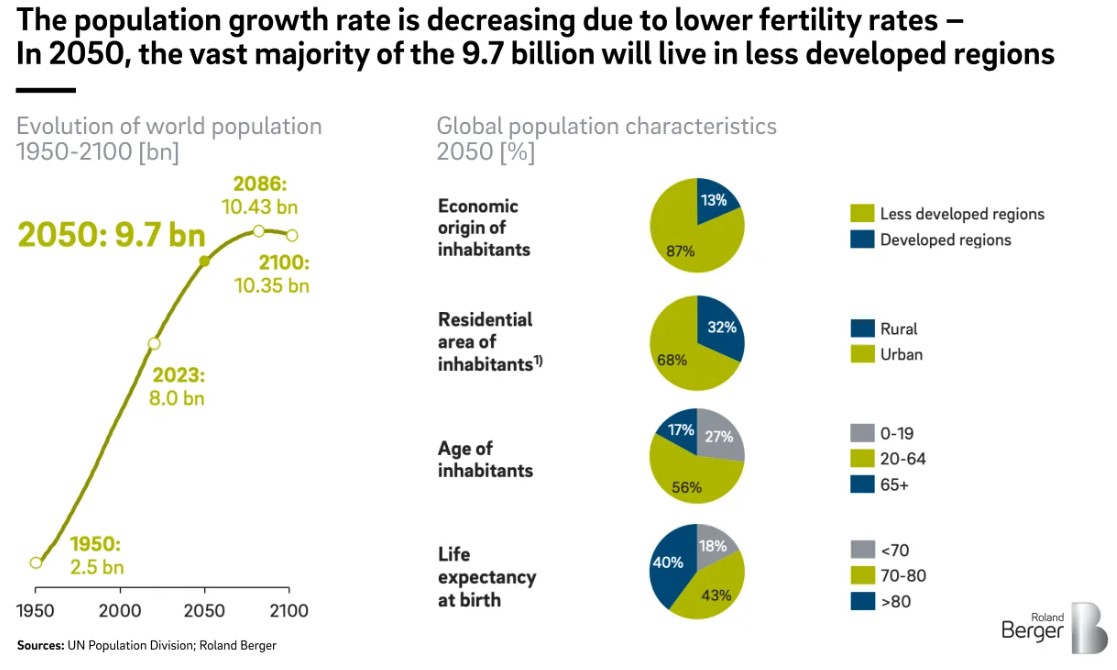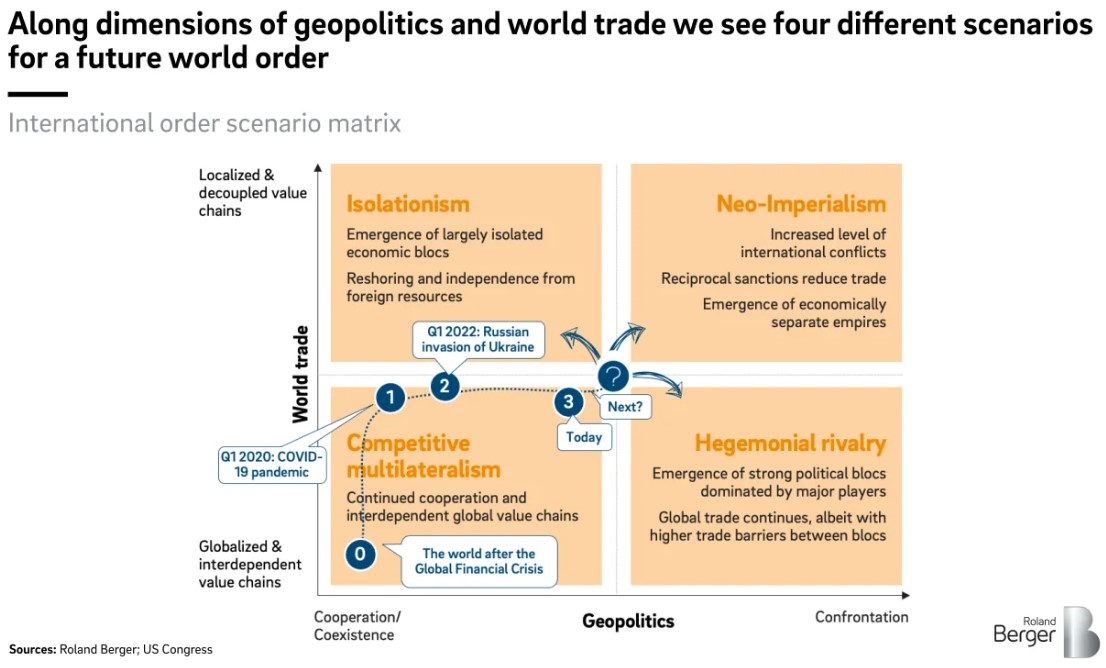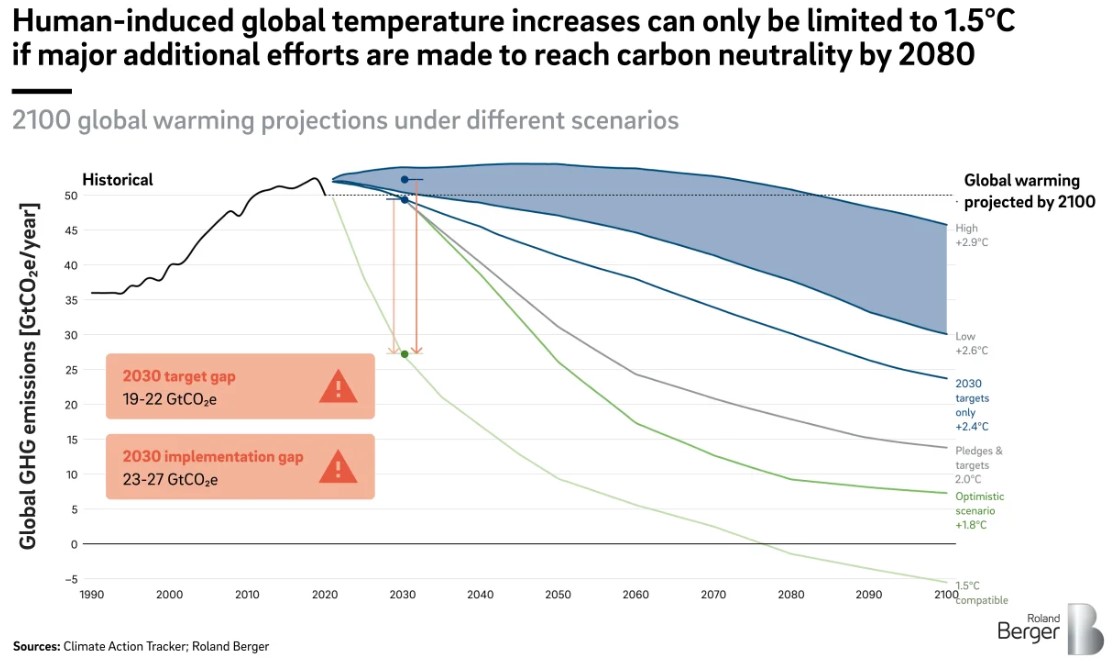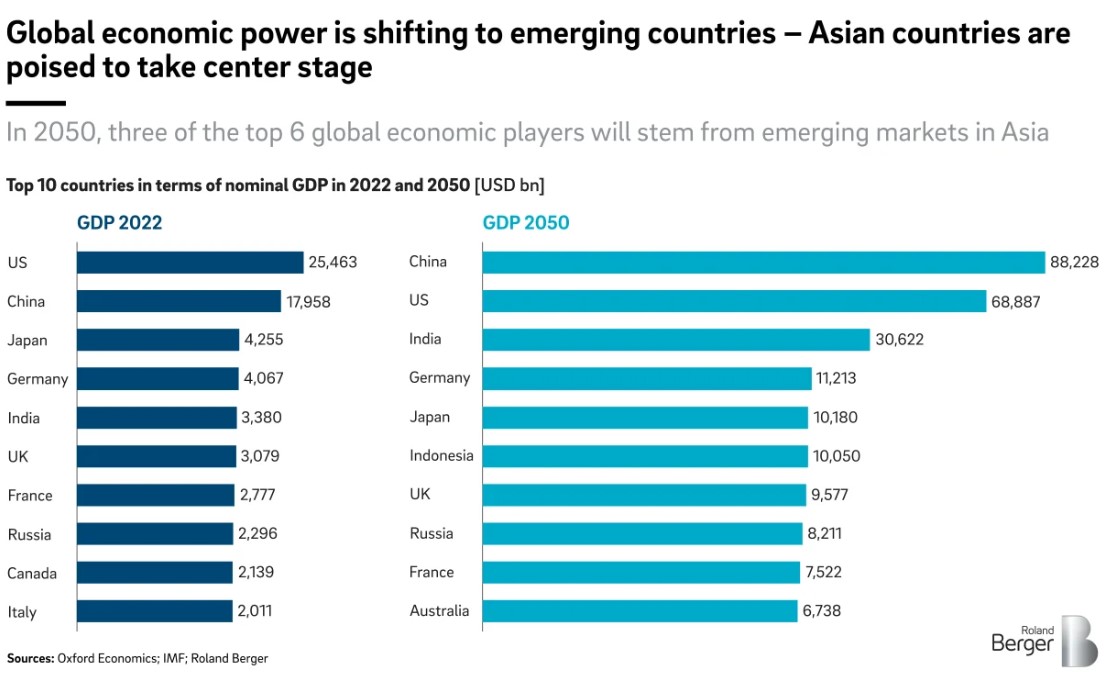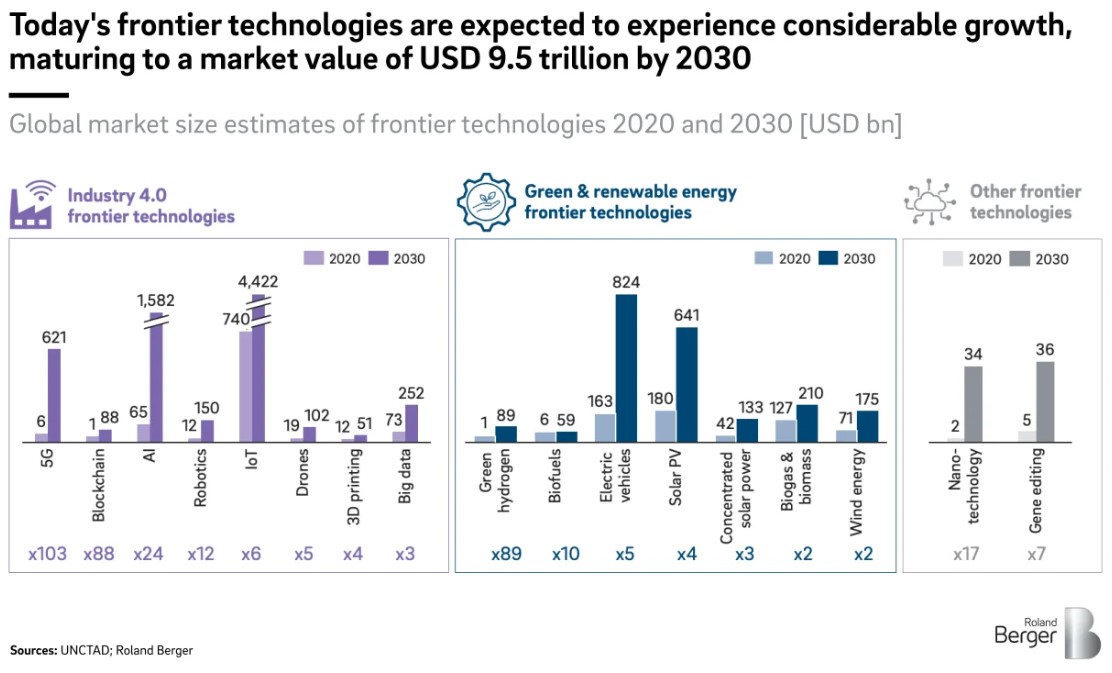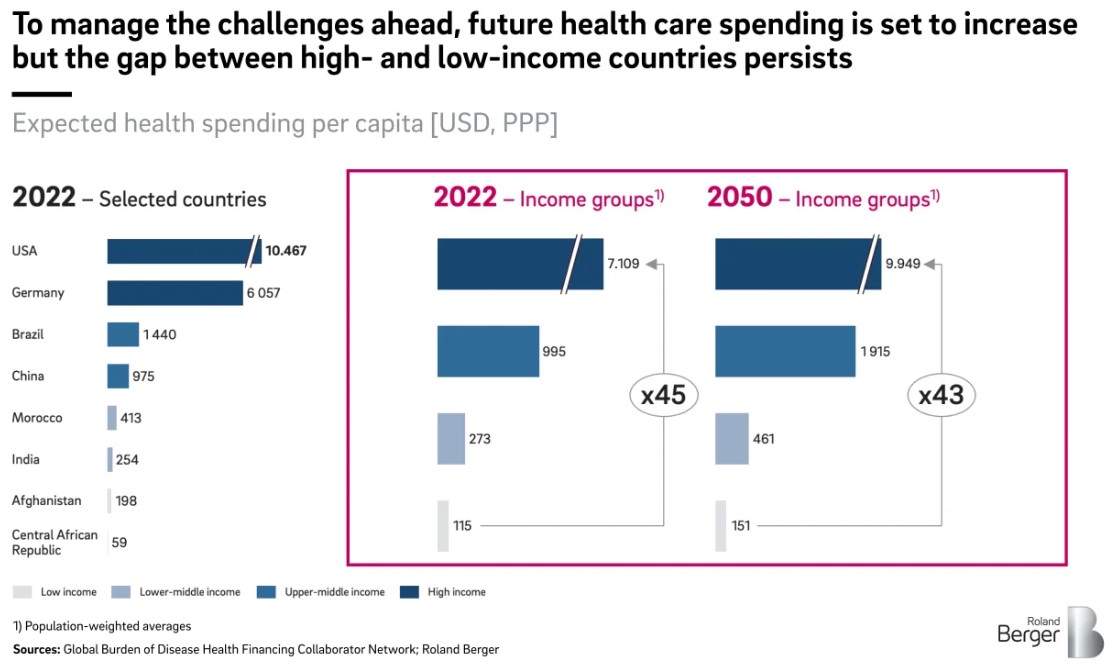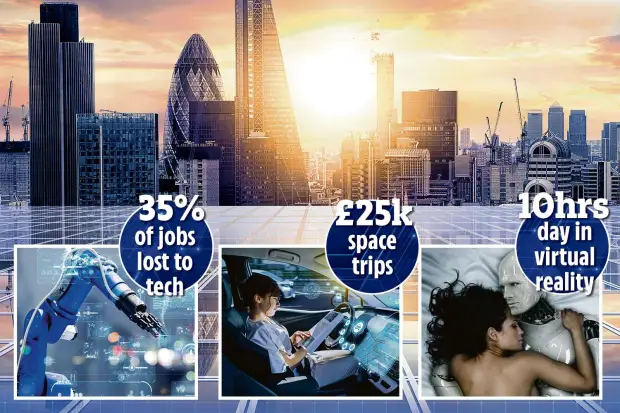
You all know that I love future trend watching and so when I stumbled across Roland Berger’s Compendium of Future Trends through 2050 … how could I resist? After all, I have already given my view on the world of 2050, but Roland Berger may be more credible as they ar a global consulting firm competing with the likes of PwC and Deloitte. I donr’t compete with anyone except myself.
The Compendium looks at six dimensions of change covering people and society, politics and governance, environment and resources, economics and business, technology and innovation, and health and care.
Let’s begin with People and Society.
Population. Due to declining birth rates, world population growth will slow down slightly in the coming decades. In 2050, 9.7 billion people will populate our planet – today (2023) there are 8 billion. Growth varies greatly between country clusters and regions/continents. While the population in most developed countries is declining, many emerging and developing countries are still growing strongly. Africa is showing the strongest growth, while Europe’s population is shrinking. The most populous continent remains Asia; the largest countries in 2050 will be India, China, Nigeria, the USA and Pakistan. Society is aging due to low birth rates in many industrialized countries.
Migration. The movement of people across national borders, but also within, will continue in the future. The reasons are manifold: the pursuit of economic betterment, or the flight from violence and – increasingly – climate change, which makes life much more difficult or even impossible in many regions.
Education and Labour. People, and thus the entire economy of a country, benefit from good educational systems. Forecasts expect levels of education to increase worldwide, which will benefit people in emerging and developing countries in particular. The beforementioned aging of society in industrialized countries leads to a shortage of skilled workers, which could be partly mitigated by immigration from the growing developing and emerging countries.
Values. The United Nations Declaration of Human Rights is now three quarters of a century old, but massive human rights violations are still occurring worldwide. It is difficult to predict whether the human rights situation will improve by 2050. Technological development means that more and more people are able to share their opinions, raise awareness and organize protests, but at the same time it also gives states the means to carry out large-scale censorship, to disseminate propaganda or fake news, and to oppress and exert control over its people.
What about Politics and Governance?
Global Risks. Climate change, natural disasters and the loss of biodiversity are at the top of the list of global risks for the decade ahead. According to many experts, however, economic and geopolitical risks will dominate in the short term. The assessment of risks differs from country to country.
Geopolitics. Even before the Russian invasion of Ukraine, the world’s geopolitical situation was characterized by tensions between key players. Since the beginning of the war, Western democracies have been more united than ever. The future geopolitical development is uncertain, but it is to be expected that the rivalry between the different actors will continue or even increase.
Future of Democracy. In the last decade, the number of liberal democracies has declined worldwide, while the number of autocracies has increased. Within democracies, popular dissatisfaction with this form of government has been growing for almost 20 years, although there are clear differences in country comparisons.
Environment and Resources?
Climate Change & Pollution. There is a consensus among scientists that if global warming is to be limited to 1.5-2°C, emissions of greenhouse gases must be reduced quickly. This is also recognized by most politicians, but a policy that leads to climate neutrality by 2050 is far from global implementation. In addition to climate change, there is also the problem of pollution, such as exhaust fumes and plastic waste.
Biodiversity. Biodiversity is on the decline in many parts of the world. Biological diversity is not just of intrinsic value – numerous species are instrumental in providing huge services for the economy, such as bees acting as pollinators in agriculture, or whales and krill as CO2 stores.
Resources & Raw Materials. Unless there is a global shift in energy policy, fossil fuels will still account for the largest share of energy consumption in 2050. Regarding water, the focus is on increasing the efficiency of the supply chain as well as of consumption. Regarding food, the aim is also to increase productivity in agriculture. Other raw materials, such as rare earths, are often found in just a handful of countries, which almost inevitably leads to strong dependencies among end users.
Economics and Business.
Global Trade & Value Chains. Before the 2008/2009 financial crisis, global growth of trade was significantly faster than global growth of GDP – globalization was progressing at a rapid pace. Since the financial crisis, both growth rates have been almost the same. Globalization has slowed, partly due to increasing trade restrictions. The domestic share of the value added of export products increased, while global value chains experienced additional pressure from delivery problems in the wake of the COVID-19 pandemic. Many countries and companies seek a way out of the current crisis by broadening their supplier base in order to avoid one-sided dependencies.
Power Shifts. China and India are already ranked 2nd and 5th in the global ranking of economies. In 2050, China will be number 1, with a GDP significantly larger than that of the US while India will be 3rd. Indonesia climbs the top 10 to become 6th by 2050, behind Germany and Japan. Trade agreements such as the Regional Comprehensive Economic Partnership, an association of 15 countries from Asia-Pacific, are shifting economic power to emerging regions.
Energy Transformation. Energy production and energy use exert the greatest influence on the transformation regarding economy and society towards climate neutrality. Enormous efforts are required to achieve the goal by 2050. Today’s investments to reduce CO2 emissions must more than triple in the coming years – totalling more than 4 trillion US dollars annually worldwide.
Debt Challenge. The COVID-19 pandemic has resulted in already high public and private debt levels increasing further. The war in Ukraine and investments in reconstruction further increase debts of donor countries.
Technology and Innovation?
Value of Innovation. Analyses show that the most innovative economies in the world are usually also the richest. Large national economies are investing – both publicly and privately – in future technologies in order to maintain their lead. It is difficult for developing countries to improve their position because adequate research institutions, well-trained scientists, and developers are often lacking.
Frontier Technologies. Not all technologies are equally influential. The so-called frontier technologies are characterized by rapid growth and their great importance for many economic sectors. They include, for example, artificial intelligence, techniques for generating renewable energy, and nanotechnology. In the development of key technologies, China and the US occupy prominent positions.
Humans & Machines. Artificial intelligence (AI) is fundamentally changing the relationship between humans and machines. In an expert survey, half of the respondents stated that machines with AI will be able to perform all tasks better than humans within less than 40 years. On the one hand, the exponentially increasing capabilities of AI raise many hopes that pressing challenges such as climate change, hunger and diseases will be solved. On the other hand, great fears are also being expressed – remarkably by AI experts themselves – including job losses, an end to human control over many processes, harmful behaviour by AI, and even an existential threat to humanity.
Health and Care?
Global Health Challenges. Combating pandemics effectively is just one of many challenges facing healthcare systems. In addition, we particularly need better access to healthcare in developing countries, ensure healthcare in conflict areas, and reduce the negative health effects of climate change and pollution. Overcoming these challenges will neither be easy nor cheap. Although experts assume that health expenditure will increase worldwide, the gap between poor and rich countries will not decrease.
Healthcare of the Future. Medicine, medical technology and pharmaceuticals are highly research-intensive. The financial, organizational and staffing effort is considerable. Despite this, groundbreaking innovations keep making it to market – let’s just think of mRNA vaccines, which have played such a crucial role in combating the COVID-19 pandemic. Cell and gene therapy and the growing use of AI are further examples of future important healthcare applications.
Caregiving. As the population ages, the need for care will continue to increase. This particularly affects industrialized countries, but also others, such as China, where in 2050 more than a quarter of the population will be 65 years old or older. In order to ensure efficient care, high levels of investment in the care system are necessary and many additional care workers have to be recruited.
Here’s the full report:
https://www.slideshare.net/skinnercm/rolandbergertrendcompendium2050compactversionpdf
And, for more, checkout Roland Berger’s website and there are other visions of 2050 out there if you want to have a look.
Chris M Skinner
Chris Skinner is best known as an independent commentator on the financial markets through his blog, TheFinanser.com, as author of the bestselling book Digital Bank, and Chair of the European networking forum the Financial Services Club. He has been voted one of the most influential people in banking by The Financial Brand (as well as one of the best blogs), a FinTech Titan (Next Bank), one of the Fintech Leaders you need to follow (City AM, Deluxe and Jax Finance), as well as one of the Top 40 most influential people in financial technology by the Wall Street Journal's Financial News. To learn more click here...


